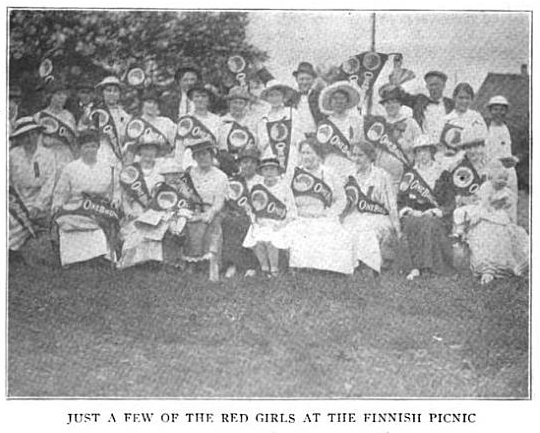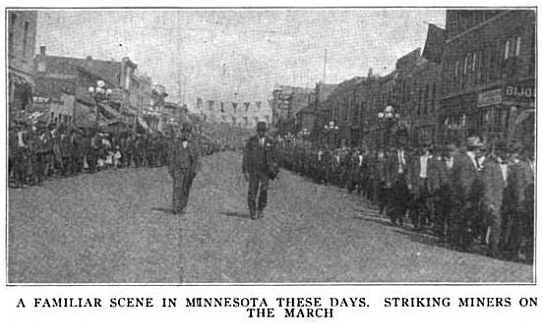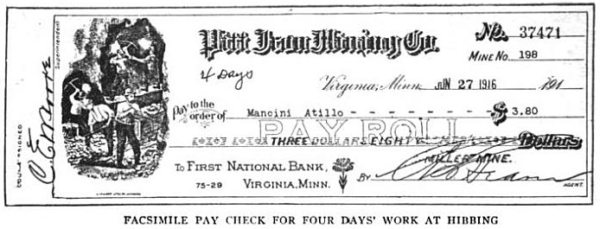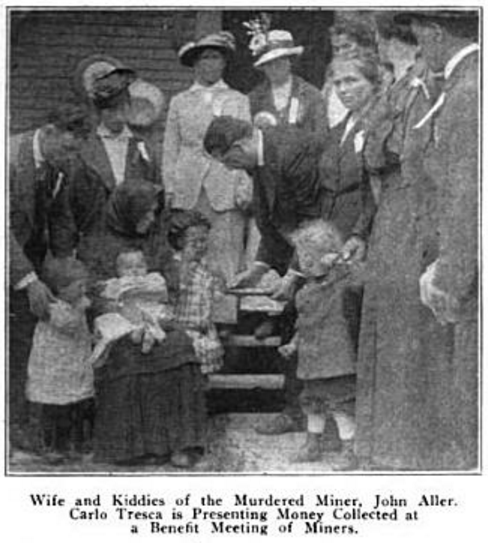There are no limits to which
powers of privilege will not go
to keep the workers in slavery.
-Mother Jones
Wednesday August 2, 1916
The Mesabi Range, Minnesota – Iron Miners Speak Out
From this month’s edition of the International Socialist Review:
The Iron Heel on the Mesaba Range
By LESLIE H. MARCY
Photographs by George Dawson
[Part II]
Hundreds of ArrestsA gunman was killed by a man whose wife had been struck by a thug. Twelve I. W. W. organizers are held on first degree murder charges for this. These men must have a first class lawyer to defend them and Judge O. N. Hilton of Denver has been secured.
Their names are: Frank Little, Joe Schmidt, Carlo Tresca, Sam Scarlett, James Gilday, L. Ahlgren, Frank Russell, Joseph Nickich, John Orlandich, Joseph Cerruogdrdovich, Leo Stark, Frank Wesserman.
A large number of strikers who were peacefully parading from Aurora to Biwabik, where they expected to attend a strike meeting, were arrested and will be tried in court at Virginia.
At Nashwauk, twenty Austrian, Italian and Finnish pickets were arrested and thrown in jail by Deputy Sheriff T. T. Riley, assisted by an army of deputies. They will probably be taken to Grand Rapids for trial.
Chief Hayes said, “We haven’t allowed the I. W. W. agitators to get even a toe-hold here. The Socialists got the ball park for a picnic and as soon as we found that it was to be but a screen for a strike meting we soon put the ‘kibosh’ on them.”
At Chisholm, Sheriff John R. Meining, at a meeting of mining company police, stated that “men deputized at the mines had full powers of deputy sheriffs and that their duties were not confined to the property they were assigned to protect, but extended throughout the county.” He further informed these deputized thugs that “he had communicated with the attorney general and an opinion received from him on the question of mobs was to the effect that in times of disturbance, such as now exist on the range, three men constitute a mob and should be immediately dispersed.”
Some of the municipal authorities are friendly, but helpless when contending against the steel corporation. On July 7th a meeting was held, composed of officials of the Range Municipalities with committees from the striking miners from the different mines. Wages and working conditions were discussed and miner after miner testified to low wages and rotten conditions. Thousands of miners work only seven months and their pay does not average $2.50 a clay.
Listen to Mike Stark of Chisholm:
Mike Stark, of Chisholm: I am a miner for fourteen years—over fourteen years, and I have eight children—I have seven living and one died. I worked now for last three years, I have got $59 check (a month), $61, $62, $63, $67, up to $70 (a month)—but a couple of times over $70 in three years, and I send four kids to the school, and the teacher would like to have the children dressed and clean and everything like that. I like to do that myself. And the children go to church, the priest likes to see that the wife is dressed nice like the American ladies, and the children dressed nice like the American children. I like that too, but I can’t. You fellows think—a single man maybe get $50 or $60 check for his own self, and we are nine of us. I get $60, $70, and I have extra—I pay rent—no, I don’t pay rent—but we pay wood, we can’t get that any more. Before we used to get it, but now they don’t let us. We pay coal, pay insurance, pay taxes, pay light, pay water—now, I think, fellows, how I can live. I have a little property and I shouldn’t say that I don’t have it because I get it from the school board. And now I have to give my property back. I can’t go any further.
And another thing is, you know the drivers wait for the car with a mule, you know. There was a poor year and the captain came around and saw driver waiting for the car, and he say: “What the hell you doing here with this mule.” He says: “I got to wait a minute or two until we get car there.” He says: “Go down with that mule to the trammer shaft so he get better air.” Now see, a man working there day and night, month and month, and year and year, and nobody asks him if he likes air, or “how you feel?” “Do you feel bad working there?” or “what is the matter with you?” Nobody don’t ask me, but when the first of the month I know when I receive check, well, you know—$2.39—”god darn it, you’re a poor man! You’re no good!” So I am no good working in there.
And listen again, you free American citizens, to this miner,—
Fulvio Pettinelli: Gentlemen, I like to tell you that I come in here in this country five years and a half ago. I been working in mine ever since. First I came to this country I worked Lincoln mine, and had bad place. No air at all, whatever, and that is my brother was working with me. There I wouldn’t get no candles—you couldn’t get no match to burn. You couldn’t light matches by no means, only by means of acetylene—carbide lamps-you know what that is, and I worked there last seven or eight months there, at least. At last I was exhausted and had to quit. I worked in there for only $2.60 a day all that time.
Later I worked for the Oliver Iron Mining Company at the Alpena. Two years ago I struck a hard place, and I make $1.97. Some other times I make over $3.00 and $3.50. What I should do then? Two years ago I got married and got American girl. I believe she has right to live as another American, so I believe further I got right to live. What should I say when I got $1.97? I should tell her: “This month don’t order meat or nothing. I only get $1.97.” I should only pay rent of the house, insurance, and such things. That month when I work contract and strike bad place we no have enough to eat. I work in some other places in Alpena for $2.17. What do you think of that. Get $45 or $50. I should have paid $12.00 for rent of the house. I should pay $5 or $6 meat; $30 on grocery bill. What will be left? Nothing. We have to go without clothes. If we eat we don’t dress, and if we dress we don’t eat. That is fact.
Such is the testimony of these men who are being crushed by the Iron Heel of the Steel Trust. The Norman property is operated by the Oliver Mining Company, a subsidiary of the Steel Trust. This branch of the industry is represented in the United States Smelter by the Pittsburgh millionaire after whom the mining company is named, and also the Oliver Steel works, near Pittsburgh, Pa.
The Norman mine is one of hundreds being operated by the Steel Trust on the Mesaba Range. It is located at Virginia, Minnesota. Here the trust is absolutely in control. The private police of the Oliver Mining Company are a conscienceless lot of wretches. Like the cossacks of Pennsylvania, recruited from the dregs of society, they are vigilant in the interests of the company.
True, these gentlemanly mine owners and guards do not eat the miners’ flesh or drink their blood, BUT THEY DO LIVE ON THEIR LABOR, THEIR DENIAL, THEIR WEARINESS AND WANT.
Hundreds of iron miners, deformed and degraded by years of hard labor for wife and children, go to their graves every year without ever having even one look in at one luxury of life.
The iron miners of Minnesota are appealing to you for aid. Their women and children must be provided for. This calls for immediate action by you. Take this matter up at the next meeting of your local or union. Pull off a picnic or get up an entertainment. Have a tag day in your town—anything to get in the game and help these workers who are standing firm in the face of overwhelming odds. Remit to John Leppanen, Secy.-Treas., Box 372, Virginia, Minn., or to William D. Haywood, Secy.-Treas., 164 W. Washington, St., Chicago, Ill.
The Finnish Socialists are literally working night and day to aid the strikers. Their daily newspaper, Sosalisti, is devoting a front page every day.
In Duluth Chief of Police McKercher said he would crush any attempt to bring out the dock-workers, and that absolutely no street meetings could be held. On July 2 the Finnish Socialists held a picnic at Fairmont Park and, although the chief had notified them there should be no speaking and absolutely no collection for the miners, there was a large enthusiastic crowd, many speeches and $56.17 collection.
Again on July 4, when celebrations were held nation-wide to celebrate “life, liberty and happiness”—the Finnish Socialists held an open-air meeting at First avenue South, where the strike was discussed. Police attempted to arrest Wm. Tanner, but the crowd protested so vigorously, he was released. They marched to the Finnish hall, where they were joined by the crowd from an adjourned I. W. W. meeting, and a protest meeting was held and resolutions passed denouncing the unwarranted usurpation of power by the police. These resolutions are published elsewhere.
On Sunday, July 9, 2,000 Finnish Socialists held a meeting, but the police were conspicuous by their absence.
Meetings are planned for Duluth, Two Harbors and Allouez, and it is hoped the ore-dock workers will all heed the call of their battling brothers on the Range and join in the valiant struggle for industrial emancipation.
Never was there a better time with war-orders flooding the big factories of the land, for the miners and ore-dock workers to demand some adequate share of “prosperity”; never a juster cause against a more pitiless or ruthless foe.
All together now, comrades—to win!
——
~~~~~~~~~~~~~~~~~~~~
SOURCE
The International Socialist Review, Volume 17
-ed by Algie Martin Simons, Charles H. Kerr
Charles H. Kerr & Company,
July 1916-June 1917
https://books.google.com/books?id=SVRIAAAAYAAJ
ISR Aug 1916
https://books.google.com/books/reader?id=SVRIAAAAYAAJ&printsec=frontcover&output=reader&source=gbs_atb&pg=GBS.PA69
“Iron Heel on the Mesaba Range” by Leslie H Marcy
https://books.google.com/books/reader?id=SVRIAAAAYAAJ&printsec=frontcover&output=reader&source=gbs_atb&pg=GBS.PA74
IMAGES
Red Girls, Mesabi, Marcy, ISR Aug 1916
https://books.google.com/books/reader?id=SVRIAAAAYAAJ&printsec=frontcover&output=reader&source=gbs_atb&pg=GBS.PA78
March, Mesabi, Marcy, ISR Aug 1916
https://books.google.com/books/reader?id=SVRIAAAAYAAJ&printsec=frontcover&output=reader&source=gbs_atb&pg=GBS.PA76
Pay Check, Mesabi, Marcy, ISR Aug 1916
https://books.google.com/books/reader?id=SVRIAAAAYAAJ&printsec=frontcover&output=reader&source=gbs_atb&pg=GBS.PA78
Tresca & Alar Family, Mesabi, Marcy, ISR Aug 1916
https://books.google.com/books/reader?id=SVRIAAAAYAAJ&printsec=frontcover&output=reader&source=gbs_atb&pg=GBS.PA79
Sixteen Tons – Tennessee Ernie Ford




